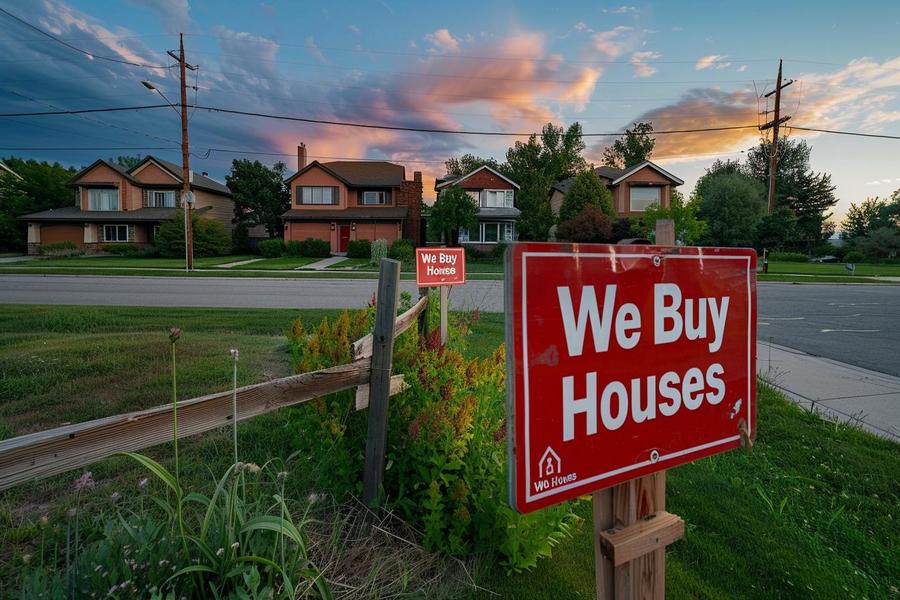Selling your rental property seems tough, right? But it's easier than you think. This guide shows you how to do it fast and for a good price. You'll learn when to sell, how to deal with taxes, and ways to make your property stand out. Plus, we'll cover the smart moves to make after the sale. Ready to get started? Let's dive in.
TL;DR
- Now is a good time to sell rental properties due to high demand in booming markets like Austin & Denver.
- Understand tax implications: Consider capital gains tax, and explore a 1031 exchange to defer these taxes.
- Selling with tenants requires knowledge of their rights and good communication.
- Preparation for sale involves: inspections, necessary repairs, and staging to attract buyers.
- Pricing competitively requires understanding your rental's market value and adjusting expectations based on market conditions.
- Real estate agents with experience in rental properties can facilitate a quicker, more profitable sale.
- From listing to closing: Create an effective listing, navigate offers and negotiations smartly, and ensure all documents are correct for closing.
- After the sale: Consider reinvesting in real estate, exploring other business opportunities, or planning for retirement with the proceeds.
Why Should You Consider Selling Your Rental Property Now?
Assessing Market Conditions for Rental Sales
Speaking from my experience, now might be the right time to sell your rental property. The market is booming in many areas. Cities like Austin, Charlotte, and Denver are hot spots. They show strong growth and demand for housing.
Understanding the Demand for Housing and Rental Investments
Right now, people want houses and rental spaces. This demand drives up property prices, including rentals. If you wait, this demand might change. Markets can shift due to things like job growth slowing.
The Right Timing for Maximizing Profit
Consider the timing if you aim to make the most profit. Review the local real estate trends in your area. For instance, if you own property in up-and-coming neighborhoods in San Francisco or Brooklyn, it might fetch a premium price now as compared to later.
The rental market stays very busy, so good properties sell fast. Rental prices have gone up because more jobs are available. But, fewer cash buyers might be looking for rental properties now. This change could affect your sale.
Selling a rental property means dealing with taxes. You must think about capital gains taxes. These can vary based on how long you have owned the property. To avoid such taxes, think about a 1031 exchange. This deal lets you swap one rental for another and delay paying taxes.
If the property has tenants, you might need to wait until their lease ends. Or, you can sell the property with the tenants still there. This choice can be good for buyers who want a ready rental.
Always check your rental for any repairs before you think about selling. Or, talk to a real estate agent who knows about selling rentals. They can guide you well on things like disclosures and the real value of your property.
How Do Taxes Affect the Sale of Your Rental Property?
Navigating Capital Gains Taxes on Your Sale
When you sell a rental property, you might pay capital gains tax. This tax applies if your sale price is higher than your purchase price. Short-term gains tax rates, applied to properties held for less than a year, are usually higher. Long-term gains, for properties held longer, have lower rates. Planning ahead helps manage potential tax hits.
For a clear understanding, consult the IRS guidelines directly.
Utilizing 1031 Exchange for Tax Deferral
A 1031 exchange lets you avoid paying capital gains taxes now. Instead, you reinvest the sale profits into another property. The catch? The new property must be "like-kind." This means it's also an investment property. Remember, strict timing rules apply. You must identify a new property within 45 days and close within 180 days.
Strategies to Minimize Tax Liability
Living in your rental before selling can exempt part of the gain from taxes. The rule is that you must live there for at least two out of the last five years. Also, consider the timing of your sale to align with market conditions and tax implications. Lastly, improving your property before selling can increase its cost basis, potentially reducing taxable gains.
Consult a tax advisor to tailor these strategies to your situation. Ensuring you meet all requirements is crucial for benefiting from these tax advantages.
Related Links:
Should You Sell Your Rental Property With Tenants?
Advantages and Challenges of Selling With Tenants
Selling your rental place with folks living there has ups and downs. A big plus is you keep getting rent money. This shows buyers that the place makes money. Yet, it can be hard too. Some buyers might want the place empty when they buy it. They might want to live there. Or they might want to pick their own tenants.
Legal Considerations and Tenant Rights
When you sell with tenants, know the law. Renters have rights. You must respect these. For example, you can't just tell them to leave because you want to sell. Most times, their lease must be up first. Or you must give them a lot of notice to leave. This keeps you and them safe in the law’s eyes.
How to Communicate With Tenants During the Sale
Talk to your tenants well. Tell them why and when you plan to sell. Be clear and kind. This can make them help the sale, not hurt it. They can keep the place nice for showings. This helps everyone win. If you talk well, they may even agree to leave earlier. Good talk helps a lot.
Selling your rental with tenants in it needs care. Know the pros and cons. Follow the law. And always keep good talk with your tenants. It makes things smoother and better for everyone. For more details on selling your rental property, please see selling a rental property.
What Are the Best Practices for Preparing Your Rental for Sale?
Conducting a Pre-Listing Inspection
Start by checking your rental top to bottom. Note problems to fix before listing.
Deciding on Necessary Repairs and Improvements
Fix major issues like leaky roofs or broken windows. Small updates can also help sell your place fast.
Staging Your Rental Property for Potential Buyers
Clean it well, remove clutter, and arrange furniture neatly. This makes your rental more appealing.
First, get a complete inspection. The inspector will find faults you might miss. This keeps surprises at bay for buyers, letting you fix critical problems in advance.
Next, evaluate the repairs needed. Major issues must go to the top of your list, as they can turn off buyers quickly. However, don't overlook minor fixes and cosmetics. A fresh coat of paint and fixed-up landscaping can boost appeal and possibly your asking price.
Finally, stage the property. This doesn’t just mean tidying up. You should aim to create an environment where potential buyers can picture themselves living. It might involve renting furniture or hiring a professional stager. The goal is to make your property stand out in the competitive market, which can speed up the selling process significantly.
Remember, in hot markets like San Francisco or New York, your effort in presenting a clean, problem-free, and appealing property can make a big difference. In less busy markets, the extra work can help your property shine even more.
For more detailed guidance, visiting sites geared toward home sales can provide deeper insights into the rental property selling process, helping you sell your rental property fast and at a good price.
How Can You Price Your Rental Property Competitively?
Understanding Your Rental's Market Value
How do you find your rental's market value? Check recent sales in your area. This initial guide lets you see what buyers might pay. Local property sales give a snapshot of the market. This method involves comparing your property to similar ones sold nearby.
Strategies for Setting a Competitive Price
What is the best strategy for setting a competitive price? Start by pricing your home near the market average. This attracts more buyers right from the start. You can adjust as needed based on interest and offers. Pricing right is key for a quick sale.
Adjusting Your Expectations According to the Market
What should you expect from the market? Understand that markets can shift. If your area is cooling down, be ready to lower your expectations. In hot markets, expect quick sales. Watch trends and adjust your pricing strategy accordingly. This ensures you stay competitive.
What Role Does a Real Estate Agent Play in the Sale?
Benefits of Hiring an Investor-Savvy Agent
An investor-savvy agent knows the rental market. They can target the right buyers fast. They use their connections to get you the best deal. This helps you sell quicker and possibly make more money.
DIY Sale vs. Professional Representation: Pros and Cons
Selling by owner lets you save on agent fees. But, you miss out on expert advice. A good agent can handle market analysis, negotiations, and legal details. They can get you a higher selling price, which often covers their fee.
Choosing the Right Agent for Your Rental Property
Pick an agent with solid experience in rental properties. They should know about local laws and tax rules. Make sure they have a good track record in your property's area. Good areas include cities with a strong job market and neighborhoods with rising rental prices.
Look for someone who respects you must handle tenant issues delicately. They should help you navigate tenant rights and lease matters. Their expertise helps ease the transition for everyone.
Agents offer a major advantage in tricky sales, like when tenants are still there. They know how to approach these delicate situations. They keep the sale smooth and professional.
Choosing to sell your rental property requires careful thought, especially in this competitive market. Hiring the right real estate agent can be your key move. It ensures a smoother, more profitable sale. Always ensure they align with your goals and understand the unique challenges of selling rental properties.
How to Handle the Sale Process from Listing to Closing?
Creating an Effective Listing for Your Rental Property
Make your listing shine to attract buyers fast. Use clear, appealing photos and a detailed description. Highlight key features like new appliances, safety features, or recent upgrades. Keep it simple and precise to catch buyers' interest.
Navigating Offers and Negotiations
Once your listing is up, offers will come. Be ready to compare these offers carefully. Look beyond just the price. Consider buyer conditions such as quick closing or all-cash bids. Being flexible and responsive helps in successful negotiations.
Finalizing the Sale: Steps to Closing
Closing is the last phase. Ensure all documents are correct and complete. Use a trustworthy rental property sales contract template. Arrange a meeting for signing papers, and handle key exchanges. This step finalizes the deal, so double-check everything.
By following these steps, you guide your rental property from listing to closing efficiently. Each phase is crucial and requires focus and careful handling to secure a successful sale.
After the Sale: What Should You Consider Next?
Reinvesting Your Sale Proceeds in Real Estate
After selling your rental property, think about buying a new home. This move can be smart. It lets you put money into another property that might grow in value. This is how you can keep your investment active in the real estate market. Buying a new home also means you can live in it or choose to rent it out again. Either way, you're building up your assets.
Exploring Opportunities Beyond Real Estate Investing
Selling your rental isn't just about finding a new property. You can use the sale money to start a business. This is great if you've been itching to try something new and entrepreneurial. Investing in a business might be risky, but it can also bring great rewards.
Planning for Your Financial Future Post-Sale
Think about setting up your retirement. The funds from your rental can boost your retirement savings. You could invest this money in stocks, bonds, or a retirement account. Smart planning now helps ensure you are secure later in life. Remember, selling your property opens up a lot of options for your financial future. Make sure to plan wisely.
This post covered why and how to sell your rental property. We looked at market conditions, tax effects, and selling with tenants. We also discussed preparing your rental for sale, pricing it right, and the role of real estate agents. Finally, we went over the sale process and next steps after selling. Selling your rental property can seem tough, but with the right approach, you can make it smooth and profitable. Keep these tips in mind to navigate your sale with confidence.















